“Your PC Has A Trojan Payment information leaked” is a recently found malware infection. It is a fake online scam used to cheat innocent users through bogus alerts and notifications. If any of the pop-ups related to this infection appear on your computer screen then your system has got a nasty piece of malware. It is a dangerous virus created by hackers make illegal profit online by tricking innocent users.

Threats like “Your PC Has A Trojan Payment information leaked” keep getting back on PC if all associated files are not removed. So you are advised to use a powerful Malware Removal Tool to run a thorough scan of your PC and delete all threats at once.
Special Offer SpyHunter 5 Anti-Malware offers a 7-day fully-functional Free Trial. Credit card required, NO charge upfront. No charge if you cancel up to two business days before the trial period ends. Read SpyHunter 5 Review, and Free SpyHunter Remover details.What is “Your PC Has A Trojan Payment information leaked”
It is a dangerous computer malware created by hacker to cheat users. It is a dangerous threat which is only focused on making profit for its creators. It shows fake warning alerts and trick users into clicking those ads to redirect users on malicious websites. “Your PC Has A Trojan Payment information leaked” is simply classified as an online scam which put your computer in unimaginable risk. If this virus manages to get on your PC, you will face several problems like annoying pop-ups, forced browser redirection, slow and freezing computer, black screen of death and so on.

“Your PC Has A Trojan Payment information leaked” ads will suddenly appear on your computer screen out of no where claiming that your system is at risk. It is a notorious malware which is programmed to scare users through fake warning alerts and then force them to pay money. It is an elaborated plan of cybercriminals to make easy profit.
This threat is designed to hijack your web browser to show scary alerts. It is also able to block your security related programs and other important features. It can work with all famous browsers such as Chrome, Firefox, Edge, Safari, IE and others. “Your PC Has A Trojan Payment information leaked” will modify your browser setting and may also even install some malicious add-ons or extensions without your knowledge.
“Your PC Has A Trojan Payment information leaked” : Threat Analysis
| Name | “Your PC Has A Trojan Payment information leaked” |
| Type | Scam Virus |
| Threat Level | High (source to distribute other harmful threats). |
| Symptoms | Users can experience lots of pop-up alerts, push notification and forced browser redirection. |
| Distribution | It could be distributed through spam emails, bundled freeware, porn or torrent sites. |
| Damage | It can modify browsers, show fake alerts, pop-ups, steal personal info and bring other threats. |
| Removal | Download SpyHunter 5 Anti-Malware |
How “Your PC Has A Trojan Payment information leaked” infection get on your PC
Hackers use various deceptive tricks to spread this kind of malicious programs. You may this virus when you click on misleading ads, fake pop-ups, alerts or warning messages that appear on your PC. Clicking of such advertisements mostly redirect on suspicious websites that host malicious scripts which drops threats on users’ computers. “Your PC Has A Trojan Payment information leaked” can also attack your PC when you download cracked software or pirated stuffs from torrent websites. If you visit porn sites or share files on unsafe network then this malware can get on your system.
“Your PC Has A Trojan Payment information leaked” virus is a privacy risk
Once inside your system, “Your PC Has A Trojan Payment information leaked” virus can easily modify the DNS settings. It can also create new registry entries that will cause lagging in system performance. It can get back on your system after removal by using those files. It can gain complete access of your browser and start tracking your online activities. “Your PC Has A Trojan Payment information leaked” can gather sensitive information such as your browsing habits, IP address, your passwords etc. and use them to show ads. Those details could also be passed over to others for making illegal profit. Sharing users personal data is quite common among cyber crooks.
If you continue to allow this threat on your PC or ignore it, “Your PC Has A Trojan Payment information leaked” virus will keep causing troubles on your system. It is a very common type of scam which is growing every day. Hackers keeps creating new and innovative pop-up alerts to grab users attention and all it take one single click to get this malware on your PC. So if you want to protect your privacy and system security, removing “Your PC Has A Trojan Payment information leaked” is the only option. It might not be so easy to delete this infection but a good anti-malware program should help you will that. You can use our step-by-step guide to get rid of this infection efficiently and prevent it from coming again on your PC.
Automatic “Your PC Has A Trojan Payment information leaked” Removal Guide
As you already know that, “Your PC Has A Trojan Payment information leaked” is a notorious and cunning malware which is not hard to remove easily by any user through manual means. This virus can keep coming back on the infected computer through files and shortcuts or settings that it has already created on your machine. Removing all those at once is the only way to get rid of this infection and stop it from getting on your system ever again.
So the best way to remove “Your PC Has A Trojan Payment information leaked” effectively is to use a powerful Automatic Removal Tool and save your time and efforts. This software is a well trusted and very powerful anti-malware program which can detect all hidden threats like Trojan, Ransomware, Worms, Spyware, Rootkits and many others. It also provides 24X7 customer support and one-on-one Spyware HelpDesk support for Custom Malware removal. Advanced System Guard feature detects and remove threats in real time. It has a very User-Friendly Interface and regular Malware updates make it most effective against latest malware attacks.
How SpyHunter 5 Anti-Malware Works
- First you need to click on below download button to get the software.
Geek’s Recommendation
Some time threats like “Your PC Has A Trojan Payment information leaked” keep getting back on the machine, if all associated files are not removed. So you are advised to use a powerful Malware Removal Tool to run a thorough scan of your PC and delete all threats at once.Compatible with: Windows 11/10/8/7 (32 Bit and 64 Bit)
- Then double-click on installer you downloaded to install the program.

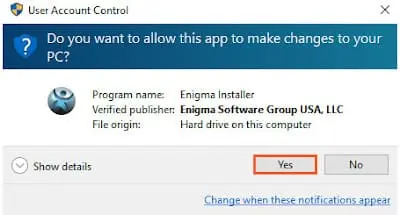
- Launch Anti-Malware application and Start Scan Now of your PC.
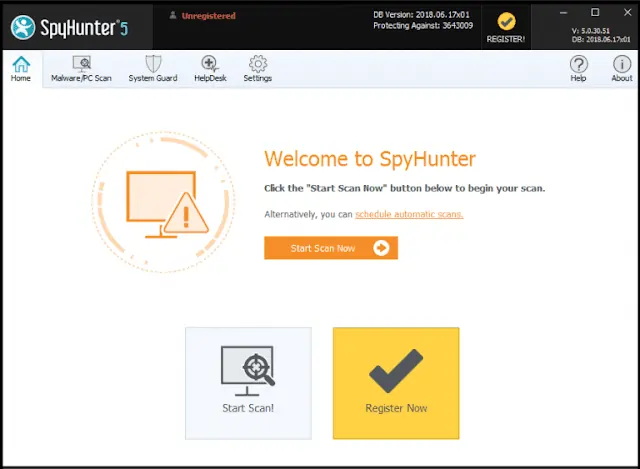
- Software will scan your PC all hidden threats and viruses on your system.
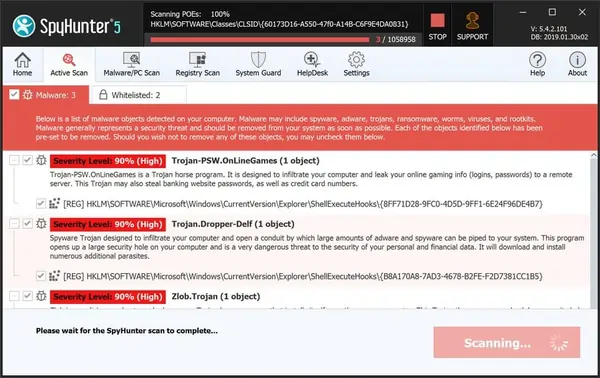
- Click on Next button to see results and delete “Your PC Has A Trojan Payment information leaked” and other threats.
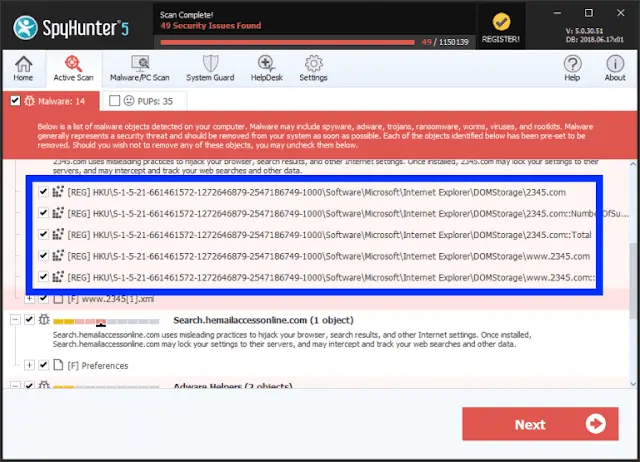
Manual “Your PC Has A Trojan Payment information leaked” Removal Guide
- You have done this before, means you have experience for removing virus manually;
- That you know your way around PC and all necessary process and applications;
- You know about Registry entry and Serious repercussions of any mistake;
- Make sure you can reverse any mistake made during “Your PC Has A Trojan Payment information leaked” manual removal.
If you don’t attain any of the above standards, then manual removal could be a very risky idea. It is most likely best for you to use Automatic Malware Removal Tool to find and delete “Your PC Has A Trojan Payment information leaked”, which is totally securely and efficient method.
Compatible with: Windows 11/10/8/7 (32 Bit and 64 Bit)
Start PC in safe mode with networking
- Press Windows Key + R buttons together on keyboard.
- Type msconfig in the Run Box then click OK button.
- Click on Boot tab then System configuration window will appear.
- Choose Safe Boot, check network box, Click Apply and press OK button.
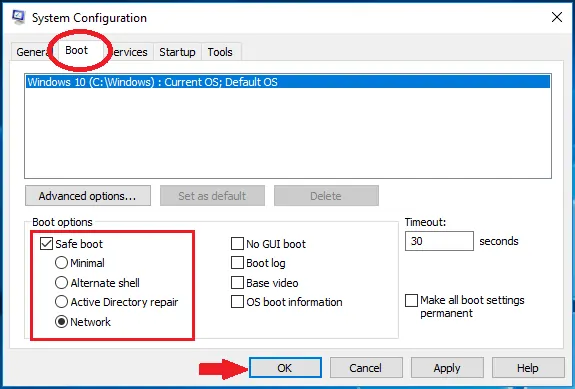
Kill Malicious Process From Task Manager
- Press Windows Key + R buttons together on keyboard.
- Type taskmgr in Run Box and then click OK button.
- Find “Your PC Has A Trojan Payment information leaked” related or any malicious process.
- Now right click on it then click End process.
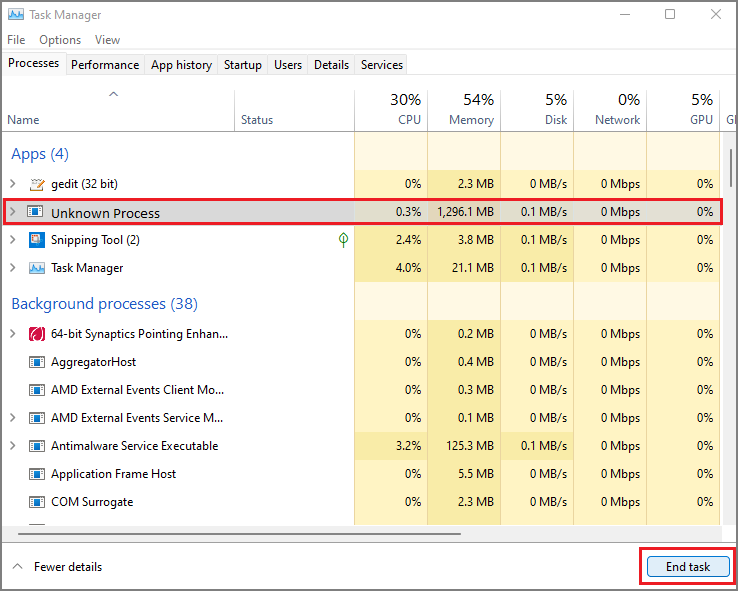
How To Uninstall “Your PC Has A Trojan Payment information leaked” from Windows PC
- First of all Press Windows Key + R buttons together.
- Type appwiz.cpl in the Run Box and then click OK button.
- Now Programs and Features windows will appear on screen.
- Find and remove all “Your PC Has A Trojan Payment information leaked” related or malicious programs.
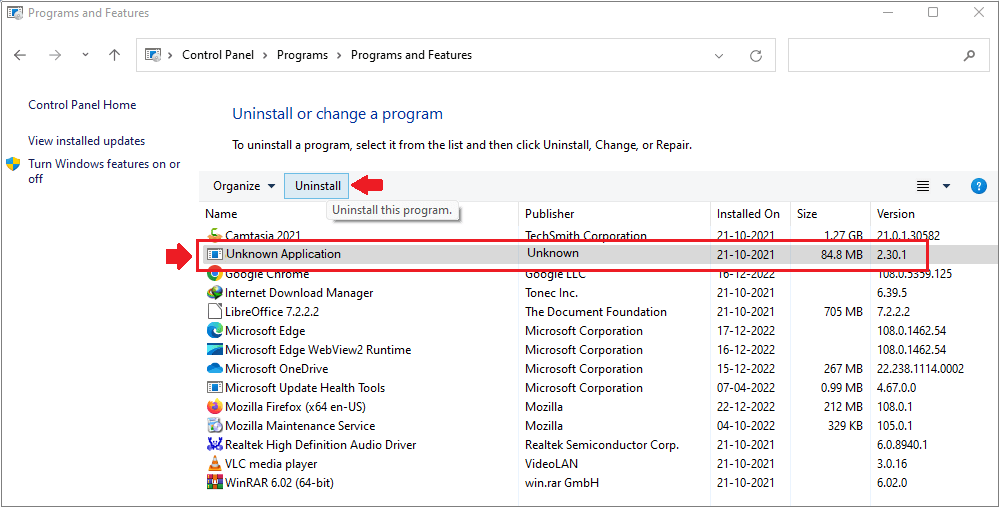
Remove Virus related Windows Registry entries
- Press Windows Key + R buttons together on keyboard.
- Type regedit in Run Box and then click OK button.
- Registry Editor will open, then press CTRL +F buttons together.
- Now type “Your PC Has A Trojan Payment information leaked” and then click on Find Next button.
- Find all the related entries and delete them one by one
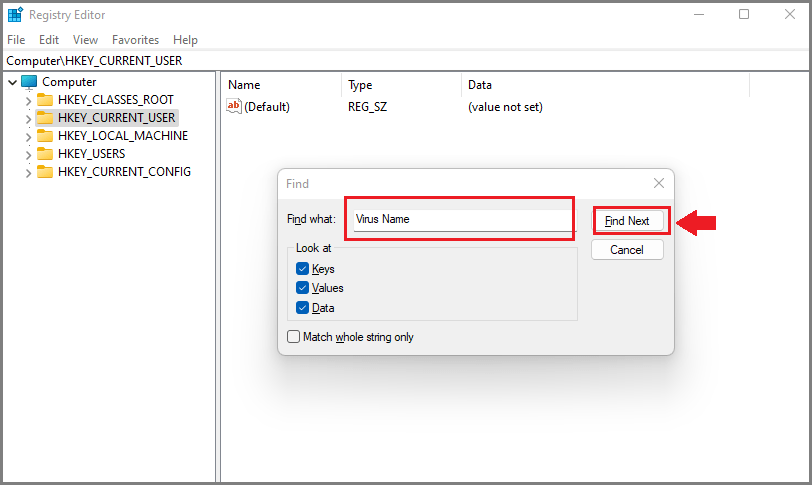
Warning : Meddling with Windows Registry files might not be a good idea if you don’t have advanced knowledge about registry files. Deleting wrong file can break down your entire system. Proceed at your own risk, or just skip this step. You can choose the Automatic Removal method and avoid all the problems.
Remove “Your PC Has A Trojan Payment information leaked” From MacOS
Stop Malicious Program From Activity Monitor
- First you need to open Utilities folder on your Mac system.
- Find the Activity Monitor icon and double-click on it to open.
- Find “Your PC Has A Trojan Payment information leaked” related process, click cross button from upper left side corner to end task.
- A pop-up dialogue box will appear on screen, click on Force Quit button.
Remove “Your PC Has A Trojan Payment information leaked” From Application Folder
- First go to Dock option (bottom of your screen) then click on Finder App.
- Now you have to open the Applications Folders to see all the programs.
- Find “Your PC Has A Trojan Payment information leaked” or any other unwanted program then move it to Trash.
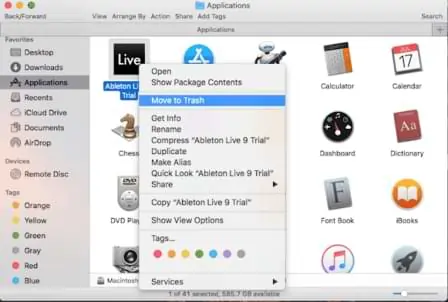
Attention : If you are using Mac computer, then it could be quite difficult to remove “Your PC Has A Trojan Payment information leaked” from your mac. The best way is to download ComboCleaner Mac Anti-Malware and see if it can detect all hidden threats and viruses on your computer. Its really super easy and you should give it a try.
ComboCleaner Mac Antivirus allows you to scan your mac for threats and viruses for free, but you will need to purchase full license to remove found threats. Read EULA.Remove “Your PC Has A Trojan Payment information leaked” From Browser
Most of the time, threats like this make several changes to the browser which help it to track victims’ online activities. It is important to completely remove “Your PC Has A Trojan Payment information leaked” from browser or it may come back. Follow below steps remove this infection your browser.
Delete Malicious Extensions From Browser
Many spyware now has the browser hijacking capabilities to show ads, offers, alerts, notifications or stealing personal information of the victim. Follow below steps to remove malicious extension from your browser.
Remove “Your PC Has A Trojan Payment information leaked” From Google Chrome
Note : Type or copy-paste – chrome://extensions in the URL bar of Google Chrome then press ENTER button to open extensions page directly or follow below steps.
- Open Google Chrome browser, click the Menu (⋮) option from upper right corner.
- Select More tools then click on Extensions option to find all installed Extensions on chrome.
- Choose “Your PC Has A Trojan Payment information leaked” related extensions then click the trash can icon to remove completely.
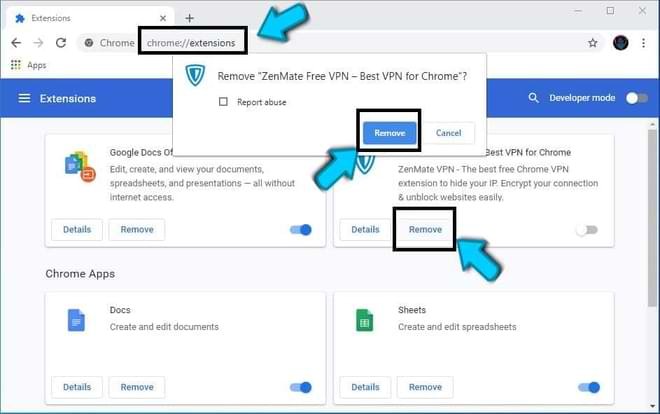
Remove “Your PC Has A Trojan Payment information leaked” From Mozilla Firefox
Note : Type or copy-paste – about:addons in URL bar Firefox then hit ENTER button to open extensions page directly or follow below steps.
- Open Mozilla Firefox browser, click on Menu (☰) option from upper right corner.
- Select Add-ons option from drop down menu the list.
- Choose Extensions option to see all installed extensions on your browser.
- Choose “Your PC Has A Trojan Payment information leaked” related extensions then click on Remove button.
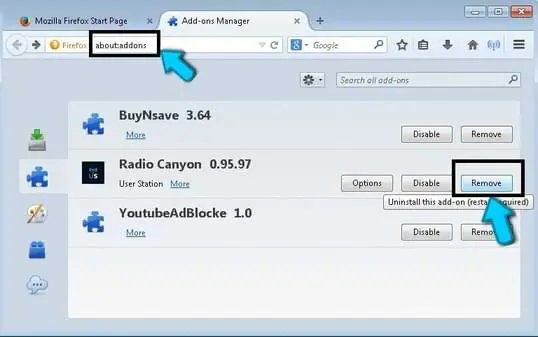
Remove “Your PC Has A Trojan Payment information leaked” From Microsoft Edge
- Open MS Edge browser, click on More Tools (⋮) option from upper right corner.
- Select Extensions option from drop down menu to see extensions on your browser.
- Choose “Your PC Has A Trojan Payment information leaked” related extensions then click on Uninstall button to remove it.
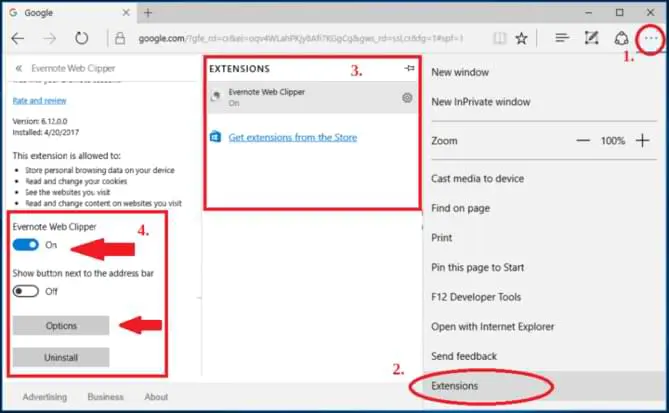
Remove “Your PC Has A Trojan Payment information leaked” From Apple Safari
- Open Safari browser then tap on Preferences option from Safari menu.
- Open the Extensions tab, find “Your PC Has A Trojan Payment information leaked” related extensions then click Uninstall button.
- Finally again click the Uninstall button to remove the extension completely.
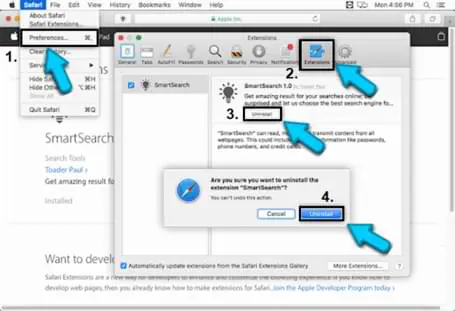
Remove “Your PC Has A Trojan Payment information leaked” From Internet Explorer
- Open Internet Explorer then click on Menu option from upper right corner.
- Select manage Add-ons option from drop down list to see installed extension.
- Find “Your PC Has A Trojan Payment information leaked” related extensions and click on Disable button to remove it.
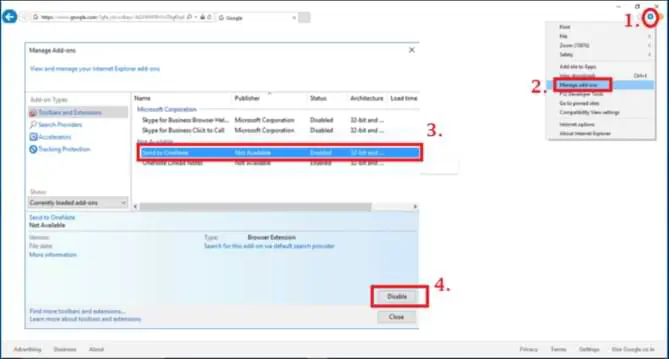
Reset Browser Setting to Default
Once you remove “Your PC Has A Trojan Payment information leaked” from your browser, you might want to reset browser to default settings to reset any changes made by virus. Follow below steps for that :Reset Google Chrome Web Browser
- Open Google Chrome, click on Menu (⋮) then select settings option.
- On Settings page, scroll down to bottom, click Show Advanced settings option.
- From Reset and clean up click on Restore settings to their original defaults.
- Finally click on Reset Settings button to reset your chrome browser.

Reset Mozilla Firefox Browser
- Open Mozilla Firefox browser, click on Menu (☰) option and select (?) icon.
- Click on Troubleshooting Information option from drop down menu.
- Then press the Refresh Firefox button and give confirmation.
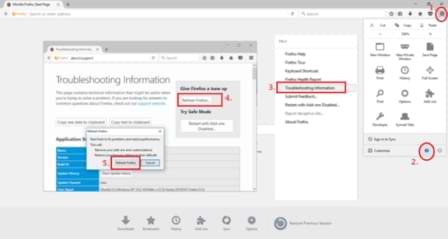
Reset MS Edge Browser
- Open MS Edge browser, click on More Tools (⋮) option and select settings.
- Click on Choose what to clear Option, choose first three options then click on Clear button.
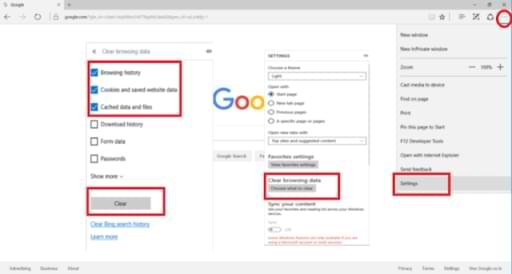
Reset Safari To Default
- Open Safari browser, tap on Safari menu and select Reset Safari option.
- Now check all the boxes and then finally click on Reset button.
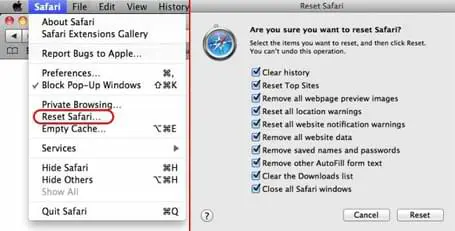
Reset Internet Explorer Browser
- Open Internet Explorer then click on Menu icon and hit Internet options.
- Visit Advanced tab, click Reset button, check Delete personal settings option and hit Reset button.
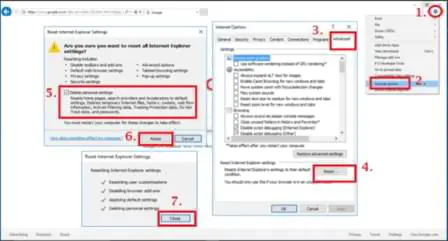
How to Enable Browser Protection
Follow below to steps to enable built-in dangerous site protection in your web browsers. You can follow the same steps if you want to stop the malware protection on your browser.
Google Chrome – Dangerous Sites Protection
- Open your Chrome web browser, type “chrome://settings” in url bar and press Enter.
- Got to bottom of the page and select “Show advanced settings” option.
- Look for Privacy and security section then click on Sync and Google services.
- Now turn on the Safe Browsing (Protect you and your device from dangerous sites) option.
Safari Browser – Change Security preferences in Safari
- Open your Safari web browser, then tap on Safari menu and select Preferences.
- Now you have to open the Security options on your Safari browser.
- Check Warn When Visiting a Fraudulent website box from Fraudulent Sites section.
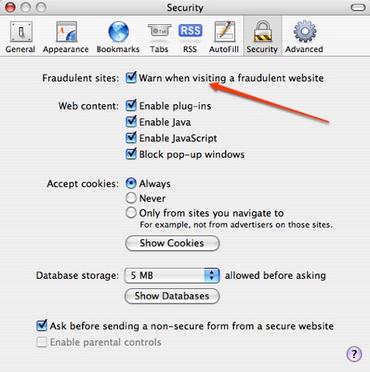
Mozilla Firefox – Block Attack Sites and Web Forgeries
- Open your Firefox web browser, click on Menu (☰) and select Options from the list.
- Now click on the Security option and then select following items:
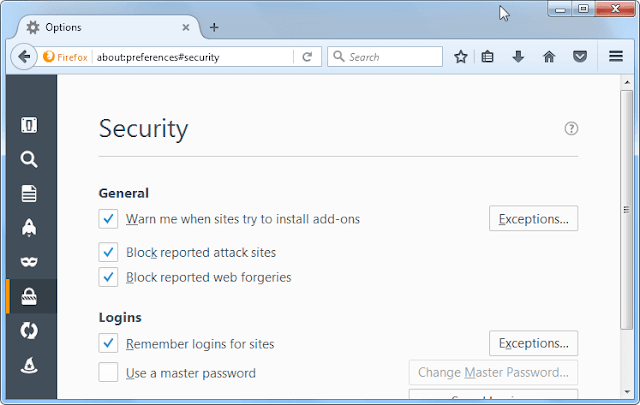
- Warn me when sites try to install add-ons
- Block reported attack sites
- Block reported web forgeries
Edge Browser – Activate SmartScreen Filter
- Open your MS Edge web browser, click on More (⋮) icon from upper right corner.
- Click on the Settings option from the Edge menu drop-down list.
- Scroll down and find View Advanced Settings option then open it.
- Turn ON the “help protect my PC from malicious sites and downloads with SmartScreen Filter” option.
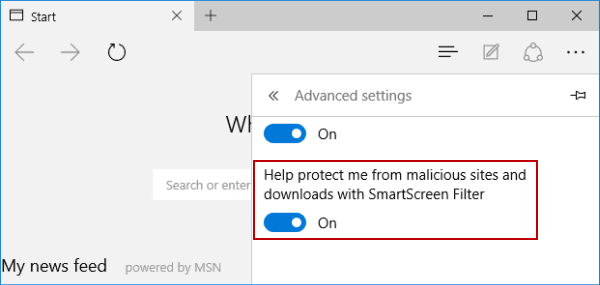
Internet Explorer – Activate Microsoft SmartScreen Filter
- Open your IE web browser, then click on Menu icon and hit Safety options.
- Now click on the SmartScreen Filter option from the drop-down list.
- Turn on SmartScreen Filter and restart your browser.
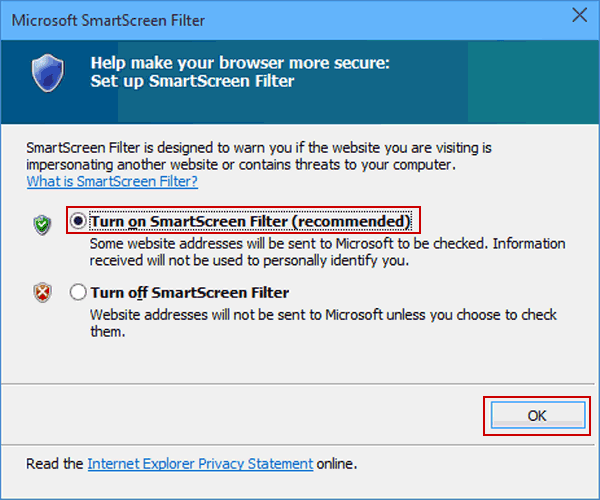
If you made these settings on your browser then phishing and malware protection on your browser is now active. But it does not mean that your computer cannot get infected by threats. These settings may block some dangerous and suspicious sites but there are other ways through which hackers can target your PC. So you must download a powerful Anti-Malware application on your computer that provides real-time protection to ensure your system security.
Tips To Prevent “Your PC Has A Trojan Payment information leaked” Virus in Future
- Use a good anti-virus, be it a free version but don’t use cracked security programs.
- Make sure that your Windows firewall is active, so it can block upcoming threats.
- Keep your Windows OS and other programs updated to avoid vulnerabilities.
- Download updates only from official websites, don’t use suspicious sites.
- Never download and install pirated software, games or illegal patches on your PC.
- Do not open spam mails from unknown sender and scan all attachments before opening.
- Never download freeware third-party programs from unreliable sources or websites.
- Avoid connecting your PC to unsafe public Wi-Fi to protect your privacy.
- You can also use a VPN to spoof your connection and avoid malicious sites.
- Create a system restore point on your system for security purpose.
- Keep backup of all your important files to avoid data loss.
Some time threats like “Your PC Has A Trojan Payment information leaked” keep getting back on the machine, if all associated files are not removed. You are advised to use a Powerful Anti-Malware Tool to run a thorough scan of your PC and delete all threats at once.
Compatible with: Windows 11/10/8/7 (32 Bit and 64 Bit)

Leave a Comment